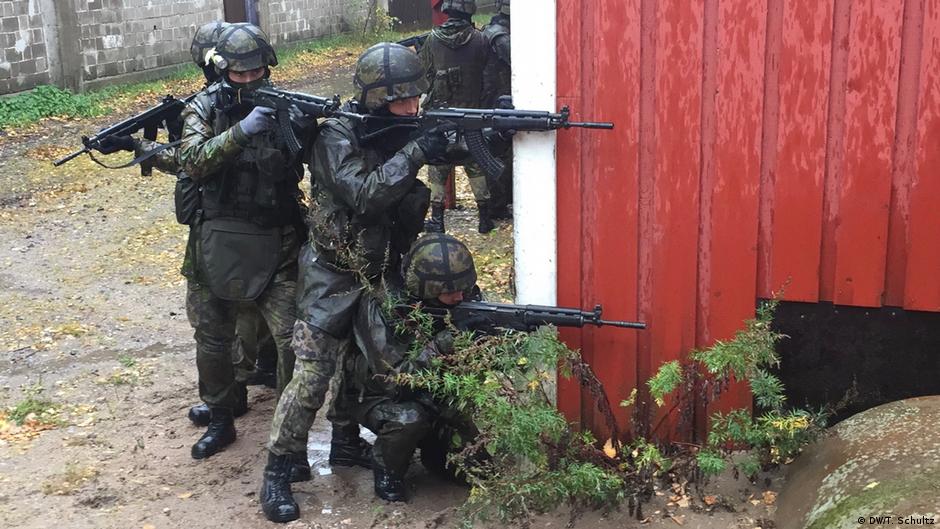'Sons of AKP': Turkish-German biker gang accused of aiding Turkish spies
#TurkeyPolitics
Politician says Osmanen Germania works with MIT spies in Germany to hunt PKK, Gulenists and anti-AKP activists
Monday 23 October 2017 13:45 UTC
Everything about the Osmanen Germania says "biker gang". They dress like extras from the US biker series
Sons of Anarchy. They roam in packs like biker gangs. They tote guns and glorify violence in slick music videos.
Yet despite the look, the 2,500-strong Turkish-German organisation denies the accusations. It says it is focused on "community service", while pushing a specific political view – that of Turkey's ruling AKP party, and an admiration for the Ottoman Empire. And anyway, they don't ride bikes.
But German officials say they their actions now exceed mere admiration of the AKP. They say the group has been co-opted by Turkish intelligence and is being used to intimidate and target the Turkish government's opponents in Germany.
Herbert Reul, the interior minister for the German state of North Rhine-Westphalia, on 18 October submitted a report to the state parliament, alleging the Osmanen Germania was being used by Turkish MIT security services as a counter-terrorism unit in Germany.
"Turkish authorities support the actions of the Osmanen Germania and view them as counter-terrorism activities in Germany – so directed towards the PKK, extreme left Turks, and the Gulen movement,” Reul wrote, according to the German newspaper
General-Anzeiger.
The Gulen movement, or Hizmet ("service"), is led by Fethullah Gulen, a US-based Turkish Muslim preacher, whom Turkish authorities say orchestrated last July's failed coup attempt along with his followers.
In response to a question in the state parliament regarding the activities of Turkish intelligence, Reul said MIT was active in North Rhine-Westphalia and cited four lists submitted to the federal government by Turkish authorities about people and institutions with links to Gulen.
He said the first list showed 165 people allegedly affiliated with Gulen currently resident in North Rhine-Westphalia.
Reul's claims are supported by residents who say they have faced intimidation at the hands of gang members.
Metin, using an alias, told Middle East Eye he was first threatened earlier this year while campaigning for No in the referendum in Turkey, which granted the Turkish president, Recep Tayyip Erdogan, nearly unlimited and unchecked powers.
"The guy threatened me and my family with violence unless we stopped campaigning has lived in our building for years," he said.
"These Osmanen Germania members are known by everyone in the Turkish-German community, but fear stops people from saying anything about them."
The 33-year-old, who has lived in Ludwigshafen for 30 years, said at first the Turkish-German community looked at the Osmanen Germania as simply "a bunch of young Turks banding together in search of an identity”.
"Now people have realised that they are a criminal gang. Drug dealers and sex traffickers," he said.
"Families are now starting to worry that their children will be fooled by this nationalistic Ottoman political charade and get drawn into criminality."
Votes, enemies and Osmanen Germania
The Osmanen Germania were formed in April 2015, just as tensions between Germany and Turkey started to simmer over political campaigning in the former.
It was only in 2012 that laws were amended and made it possible for Turks living abroad to vote in Turkish elections from the countries they lived in.
This resulted in Turkish parties, particularly the AKP, campaigning heavily with huge success in countries like Germany with large Turkish-origin populations.
Tensions boiled over in the lead-up to Turkey's April 2017 referendum, where the country decided to scrap the parliamentary system for an executive presidency. Germany, and other European countries, stopped Turkish government officials from campaigning in their countries.
The AKP government called it hypocrisy, saying groups designated as terrorist, such as the Kurdish PKK, were openly allowed to stage rallies while Turkish officials were banned.
Turkish officials have also accused Germany of harbouring Gulenists.
In a September report, the German Federal Office for Migration and Refugees said 5,040 out of 8,547 asylum applications by Turkish citizens in 2017 thus far had been rejected.
German officials have also said 615 Turkish citizens with diplomatic and service passports have also applied for asylum, without specifying whether they were all linked to the Gulen movement.
Osmanen Germania says it runs boxing clubs and helps Turkish-origin youth with schoolwork and other things.
Praise from Turkey
The only direct link shown so far between the group and Turkish authorities is in the shape of a Turkish presidential adviser, Ilnur Cevik, praising the group's work regarding the Turkish community in response to a question from a German media outlet.
Sevim Dagdelen, an MP from Die Linke party and a fierce critic of perceived inaction by the German government towards acts allegedly sponsored by Erdogan's government, has on multiple occasions submitted questions to parliament on the Osmanen Germania and believes its links with the Turkish government run far deeper.
In a question on 19 September, Dagdelen asked the federal government about an August meeting in Antalya where Mehmet Bagci, who calls himself world president of the Osmanen Germania, is alleged to have
met AKP officials.
The government response said it was "aware” of such media reports.
In another question, Dagdelen asked what information the German authorities had about the creation of a network in Germany involving the Osmanen Germania, Turkish intelligence and the Union of European Turkish Democrats (UETD), said to be the AKP's lobbying arm in Europe.
The government response said it had no information other than media reports about a network in that sense, although it was aware of individual links between the Osmanen Germania and UETD. And that members of Osmanen Germania
acted as security at UETD functions.
The Osmanen Germania boasts more than 40 chapters across Germany. But the majority are located in Germany's most populous state, North Rhine-Westphalia.
Reul, the state interior minister, said they were one of the fastest-growing gangs and that they had eight chapters in the state alone. He said the group was under intense police surveillance and that Osmanen Germania chapters in other states had also been raided by police in connection with drugs and weapons trafficking.
For the time being, they remain relatively less of a force outside their stronghold of North Rhine-Westphalia.
Limited reach
Devrim, a Turkish-origin German citizen from Hamburg, told MEE the Osmanen Germania were almost unknown by the Turkish community in the north.
"I have read a few newspaper articles about some of their criminal acts in the city. Apart from that I have never heard anyone in the community mention them,” said Devrim.
Their rapid rise and open political stance has, however, fuelled fears of clashes with other gangs run by Kurds, extreme left Turkish or German gangs.
Clashes between the Osmanen Germania and some chapters of the Hell's Angels biker gang, and also with Kurdish gangs such as Bahoz, which is said to be linked to the PKK, have been reported in German media since 2016.
"Osmanen Germania, Bahoz and all these other biker groups are just criminal gangs, nothing else," said Mertin.
"All this flag waving and political affiliations are to make themselves feel better. Their nationalism and patriotism is really nothing more than hatred and racism.”
Neither the Osmanen Germania, nor the Turkish government, have commented on the allegations by Reul.


 ) pysyivat vallan syrjassa kiinni vain taman saman puolueen tuella, joka aina otti kirstun vartijan salkun itselleen (ikaankuin sen takeeksi, etta "hallitussopimukset" pitavat).
) pysyivat vallan syrjassa kiinni vain taman saman puolueen tuella, joka aina otti kirstun vartijan salkun itselleen (ikaankuin sen takeeksi, etta "hallitussopimukset" pitavat).



